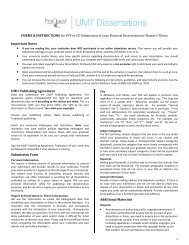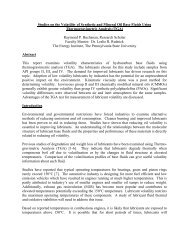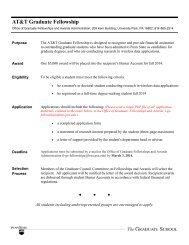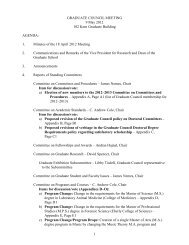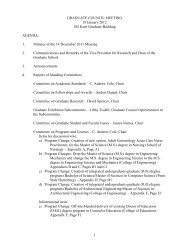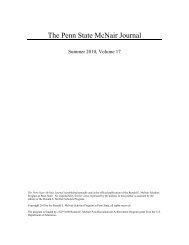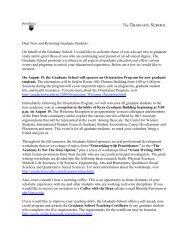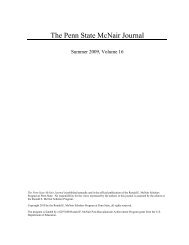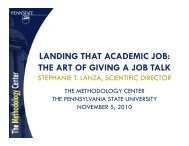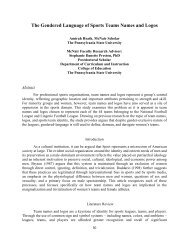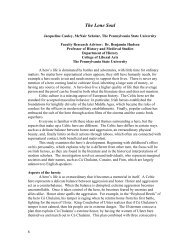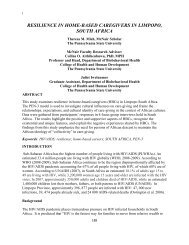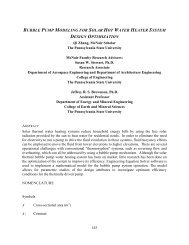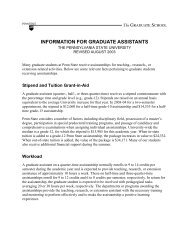Searching for Grant Opportunities - the list of offices
Searching for Grant Opportunities - the list of offices
Searching for Grant Opportunities - the list of offices
You also want an ePaper? Increase the reach of your titles
YUMPU automatically turns print PDFs into web optimized ePapers that Google loves.
Graduate School<br />
<strong>Grant</strong> Writing Workshops<br />
Fall 2010<br />
Introductory <strong>Grant</strong> Writing<br />
September 8, 201o<br />
Lee Carpenter
Graduate <strong>Grant</strong> Writing Workshops<br />
Introductory Workshop Wednesday, September 8 1:00 ‐ 3:00 pm<br />
Quantitative Social Sciences Thursday, September 16 1:00 ‐ 3:00 pm<br />
Arts and Humanities Thursday, September 23 2:30 ‐ 4:30 pm<br />
Life Sciences<br />
Thursday, September 30 2:00 ‐ 4:00 pm<br />
Medical Sciences* Wednesday, October 6 1:30 ‐ 3:30 pm<br />
Engineering Wednesday, October 14 3:00 ‐ 5:00 pm<br />
Qualitative Social Sciences Thursday, October 21 1:30 ‐ 3:30 pm<br />
Physical Sciences<br />
Wednesday, October 27 1:30 ‐ 3:30 pm<br />
http://www.gradsch.psu.edu/current/grantwriting.html
Overview<br />
Today’s Instructor<br />
Why Learn about <strong>Grant</strong>s/<strong>Grant</strong> Writing?<br />
Types <strong>of</strong> <strong>Grant</strong> Funding<br />
Sources <strong>of</strong> <strong>Grant</strong> Funding<br />
Obtaining <strong>Grant</strong> Funding<br />
<strong>Searching</strong> <strong>for</strong> Funding <strong>Opportunities</strong><br />
<strong>Grant</strong> Terminology<br />
Tips <strong>for</strong> Successful <strong>Grant</strong> Writing<br />
Questions/Discussion
O<strong>the</strong>r Penn State <strong>Grant</strong> Writing/Funding <strong>Opportunities</strong><br />
Social Science Research Institute/Children, Youth, and<br />
Families Consortium Seminars<br />
Workshop 2: Locating Funding Sources <strong>for</strong> Your Research<br />
When: November 5, 2010<br />
Time: 3:30‐5:00 p.m.<br />
Where: Life Sciences 004<br />
Speaker: Keith Aronson, SSRI/CYFC Associate Director<br />
Workshop 3: <strong>Grant</strong> Writing and Review Process (NIH Focus)<br />
When: December 3, 2010<br />
Time: 12:00‐3:00 p.m.<br />
Where: East 101, Henderson; via Adobe Connect Pro<br />
Workshop 4: <strong>Grant</strong> Writing and Review Process (Foundation Focus)<br />
When: February 11, 2011<br />
Time: 9:00 a.m.‐11:00 a.m.<br />
Where: TBA; via Adobe Connect Pro<br />
Workshop 5: <strong>Grant</strong> Writing and Review Process (NSF Focus)<br />
When: April 18, 2011<br />
Time: 9:00 a.m.‐11:00 a.m.<br />
Where: TBA; via Adobe Connect Pro<br />
Speaker: Robert O'Connor, Director, Program in Decision, Risk and Management Sciences, NSF
Today’s Instructor:<br />
Lee Carpenter<br />
<br />
Project Associate and Contracts Coordinator, Prevention Research<br />
Center, College <strong>of</strong> Health and Human Development<br />
<br />
25+ Years <strong>of</strong> <strong>Grant</strong> Writing/Editing/Funding Assistance in Major,<br />
Well‐funded Research Units at Penn State<br />
<br />
Have Assisted with Major <strong>Grant</strong> Initiatives <strong>for</strong> National Science<br />
Foundation, National Institutes <strong>of</strong> Health, and o<strong>the</strong>rs<br />
<br />
Have Taught Seminars on <strong>Searching</strong> <strong>for</strong> Funding, Developing <strong>Grant</strong><br />
Proposals, Etc., including Graduate Student Funding Focus<br />
<br />
Working Primarily in Health and Social Sciences, Environment and<br />
Energy, and Policy—Faculty, Research Associates, and Graduate<br />
Students
Why Learn about <strong>Grant</strong>s/<br />
<strong>Grant</strong> Writing?
Why Learn about <strong>Grant</strong>s/<br />
<strong>Grant</strong> Writing?<br />
Important to well‐rounded graduate<br />
education/pr<strong>of</strong>essional development<br />
Support <strong>for</strong> innovative, cutting‐edge<br />
research and/or programs<br />
Building a record <strong>of</strong> funding<br />
Often necessary <strong>for</strong> employment,<br />
tenure/promotion<br />
Increased competitiveness as job candidate<br />
Increasingly prevalent in all career tracks
Why You May Need <strong>Grant</strong> Money<br />
As Graduate Students<br />
• Stipend/Summer salary<br />
• Tuition<br />
• Materials (incl. Equipment)<br />
• Project‐related Travel<br />
• Subject Payments<br />
• Access to Equipment<br />
• Undergraduate Research<br />
Assistants<br />
Government <strong>Grant</strong> Funds will<br />
not* pay <strong>for</strong>…<br />
• Books or o<strong>the</strong>r publications<br />
• Pr<strong>of</strong>essional society<br />
memberships<br />
• Lab refreshments<br />
• Travel from home to lab<br />
• Furniture <strong>for</strong> <strong>the</strong> lab<br />
• Equipment that is not<br />
research-project related<br />
• Express mail (Fed Ex)<br />
• Personal computers<br />
•There are always exceptions – <strong>the</strong><br />
key is “project-related”
Why You May Need <strong>Grant</strong> Money<br />
As Postdoctoral Fellows/Trainees<br />
• All items <strong>list</strong>ed previously, and…<br />
<br />
Graduate and Undergraduate Research Assistants<br />
As Junior Faculty<br />
• All items <strong>list</strong>ed previously, and…<br />
Funds <strong>for</strong> Graduate Research Assistants and Postdocs<br />
(especially stipends and tuition)<br />
Project‐related Collaborator Travel and Communication<br />
Course Releases<br />
Project‐related Equipment<br />
Collaborative Projects and Resource Sharing
Types <strong>of</strong> <strong>Grant</strong> Funding
Types <strong>of</strong> <strong>Grant</strong> Funding<br />
<strong>Grant</strong><br />
• vs. Fellowship<br />
• vs. Contract<br />
• vs. Award<br />
• vs. Gift<br />
Types <strong>of</strong> <strong>Grant</strong>s<br />
• Research grant<br />
• Travel grant<br />
• Conference grant<br />
• Curriculum development grant<br />
• Collaborative grant<br />
• Dissertation grant<br />
• Postdoctoral research grant<br />
• External vs. internal
Sources <strong>of</strong> <strong>Grant</strong> Funding
Sources <strong>of</strong> <strong>Grant</strong> Funding<br />
State and Federal Government<br />
Military<br />
Corporations<br />
Foundations<br />
Organizations<br />
Internal Funds (available at <strong>the</strong> University)
Obtaining <strong>Grant</strong> Funding:<br />
Six Basic Steps
Step 1: Determine why you need grant money<br />
Step 2: Generate a fundable idea<br />
Step 3: Determine how much you need<br />
Step 4: Find grant/funding opportunities that fit <strong>the</strong><br />
two issues above as well as fit your project idea/topic<br />
Step 5: Apply <strong>for</strong> that grant/funding<br />
• Develop a unique, innovative, fundable project idea<br />
• Get as much advice and assistance as you can when<br />
applying <strong>for</strong> a grant<br />
• Expect to be turned down many times be<strong>for</strong>e<br />
attaining success<br />
Step 6: Get <strong>the</strong> grant, conduct <strong>the</strong> research, and decide<br />
how to proceed next on your research trajectory
<strong>Searching</strong> <strong>for</strong> Funding<br />
<strong>Opportunities</strong>
Finding External Funding<br />
<br />
<br />
<br />
<br />
1: Search Funding Opportunity Databases and Consult College<br />
Research Offices, O<strong>the</strong>r Research Units, and colleagues at Penn<br />
State; do a search <strong>of</strong> funded projects via NIH or NSF Award Search<br />
2: Set up Funding Alerts<br />
• Funding alerts are email notifications <strong>of</strong> new funding opportunities in specific<br />
fields or from individual sponsors. Many alerts can be customized. E.g., NSF,<br />
NIH, COS.<br />
3: Search Funding Guides<br />
• O<strong>the</strong>r online resources, such as web sites, pathfinders, and publications, are<br />
specialized by type <strong>of</strong> researcher or field <strong>of</strong> study. Look <strong>for</strong> additional in<strong>for</strong>mation<br />
specific to faculty, staff, postdoctoral scholars or graduate students.<br />
4: Use Print Resources<br />
• Reference books on funding opportunities, grantmaking organizations, and<br />
proposal writing as well as a collection <strong>of</strong> successful graduate fellowship<br />
proposals are available.
Sources <strong>of</strong> <strong>Grant</strong> Funding,<br />
Redux<br />
State and Federal Government<br />
Military<br />
Corporations<br />
Foundations<br />
Organizations<br />
Internal Funds (available at <strong>the</strong> University)
Federal Funding<br />
<br />
<br />
Federal agencies ‐ <strong>the</strong> easiest to search <strong>for</strong><br />
opportunities<br />
• More uni<strong>for</strong>m in:<br />
<strong>Grant</strong> submission process<br />
Web in<strong>for</strong>mation available<br />
Regularity <strong>of</strong> procedures<br />
Must submit to <strong>the</strong> right section <strong>of</strong> an agency<br />
• NIH: e.g., NIDA F, Health Services, NIDA K,<br />
Training and Career Awards<br />
• NSF: e.g., Social, Behavioral & Economics
Examples<br />
• National Institutes <strong>of</strong> Health<br />
(http://www.nih.gov)<br />
• National Science Foundation<br />
(http://www.nsf.gov)<br />
• U.S. Department <strong>of</strong> Agriculture<br />
(http://www.usda.gov)<br />
• U.S. Department <strong>of</strong> Education<br />
(http://www.ed.gov)<br />
• National Institute <strong>of</strong> Justice<br />
(http://www.ojp.usdoj.gov/nij/)
Foundations<br />
~ 70,000 Foundations<br />
Need to find Foundations most relevant<br />
to your work<br />
Several types <strong>of</strong> Foundations:<br />
• National<br />
• Community<br />
• Corporate<br />
• Family<br />
• Special purpose
Foundations<br />
<br />
<br />
<br />
<br />
<br />
Less uni<strong>for</strong>m than federal agencies in grant submission<br />
procedures and processes<br />
• More idiosyncratic<br />
National (larger) foundations generally more open to<br />
search processes than local (smaller)<br />
Some foundations cannot apply to – <strong>the</strong>y come to you<br />
Local knowledge <strong>of</strong> a foundation and its priorities and<br />
procedures critical ‐ but difficult to get<br />
Word <strong>of</strong> mouth – talk to related key people
Foundation Resources<br />
Foundation Directory<br />
Foundation <strong>Grant</strong>s Index<br />
The Foundation 1000<br />
Corporate Foundation Pr<strong>of</strong>iles<br />
The <strong>Grant</strong>s Register<br />
Chronicle <strong>of</strong> Philanthropy
<strong>Searching</strong> <strong>for</strong> Funding <strong>Opportunities</strong><br />
Community <strong>of</strong> Science ‐ http://fundingopps.cos.com/cgibin/fo2/search<br />
<strong>Grant</strong>s.gov ‐ Find ‐<br />
http://www.grants.gov/applicants/find_grant_opportunities.jsp<br />
<strong>Grant</strong>s Net ‐ AAAS ‐<br />
http://sciencecareers.sciencemag.org/funding?CFID=18956&CFTOKEN=<br />
<br />
20417659<br />
Graduate <strong>Grant</strong> and Fellowship Database ‐ maintained by <strong>the</strong><br />
University <strong>of</strong> Notre Dame ‐ www.grad.nd.edu/gfd/ and ano<strong>the</strong>r at<br />
Cornell ‐ www.gradschool.cornell.edu/?p=132<br />
Foundation Finder (from <strong>the</strong> Foundation Center) ‐<br />
http://foundationcenter.org/findfunders/foundfinder/<br />
Funding Alerts from specific sponsors (NIH, NSF, USDA, etc.) –<br />
examples: http://www.nsf.gov/funding/;<br />
http://grants.nih.gov/grants/guide/;<br />
http://www.csrees.usda.gov/fo/funding.cfm
Boundary conditions <strong>of</strong><br />
agency/opportunity:<br />
• Research scope <strong>of</strong> agency opportunity<br />
Map to your working idea<br />
• $ limit<br />
• Deadline date, duration <strong>of</strong> research project<br />
• Any local demands or expectations?<br />
• Proposal <strong>for</strong>mat rules/procedures<br />
• Criteria/probability <strong>for</strong> funding<br />
Any current relevant RFAs or RFPs?<br />
Read all announcements carefully
<strong>Grant</strong> Terminology
<strong>Grant</strong> Terminology<br />
Sponsor<br />
PI = Principal Investigator<br />
Co-I or Co-PI = co-Investigator<br />
Postdoctoral Fellow (senior personnel)<br />
Research Associate (senior personnel)<br />
Research Assistant (senior personnel)<br />
Consultant<br />
Subcontractor<br />
Prime or lead institution<br />
Percent ef<strong>for</strong>t
<strong>Grant</strong> Terminology<br />
Budget Terminology<br />
• Direct costs<br />
Salary (AY [sabbatical and course release] and<br />
summer)<br />
Fringe benefits (<strong>the</strong> AY and Summer rates)<br />
O<strong>the</strong>r direct costs<br />
• Modified Total Direct Costs (MTDC)<br />
• Indirect costs (aka Facilities and Administrative or<br />
F&A costs) – rates vary by institution and type and<br />
location <strong>of</strong> research<br />
• Total costs = direct costs + indirect costs<br />
• Unallowable costs<br />
• Cost sharing –asking <strong>the</strong> institution to split costs<br />
with <strong>the</strong> funding agency (aka: matching funds)
Tips <strong>for</strong> Successful<br />
<strong>Grant</strong> Writing
Idea<br />
<strong>Grant</strong> Award <strong>Grant</strong> Proposal<br />
Agency
Revisions and resubmissions part <strong>of</strong><br />
long‐term journey; build <strong>the</strong>m into<br />
your agenda<br />
• Especially important <strong>for</strong> P&T<br />
process
<strong>Grant</strong>s are rarely awarded first time (R01s about<br />
12%)<br />
Rarely awarded to first‐time investigators, BUT:<br />
• NIH Early Stage Investigator policy—Major<br />
initiative to enhance peer review process to<br />
"fund <strong>the</strong> best science, by <strong>the</strong> best scientists,<br />
with <strong>the</strong> least amount<br />
<strong>of</strong> administrative burden."<br />
• New Innovator Award<br />
All grant applications are different, but you can<br />
create some <strong>of</strong> your own boilerplate language to<br />
use over and over again<br />
• Describe your prior research experience<br />
• Describe your short‐term research goals<br />
• Describe your long‐term career goals<br />
• Describe your current project and expected outcome<br />
Details are important<br />
Show some thought, planning<br />
Get feedback from experienced writers and<br />
reviewers
Typical Sections <strong>of</strong> a <strong>Grant</strong> Proposal<br />
Cover Page (Face Page, cover letter, etc.)<br />
Abstract (Summary, description)<br />
Table <strong>of</strong> Contents<br />
Research Plan (project description, narrative) – structure<br />
varies by program/agency<br />
Timeline or work plan<br />
Listing <strong>of</strong> personnel and <strong>the</strong>ir ef<strong>for</strong>t on <strong>the</strong> project<br />
Biosketches (vitae, resumes)<br />
Prior research or project funding (current and pending<br />
support, o<strong>the</strong>r support)<br />
Budget and budget justification<br />
Facilities and Resources<br />
Appendices (attachments)
Tips <strong>for</strong> Successful <strong>Grant</strong> Writing<br />
1. Understand how time, money, and project scope <strong>of</strong> work all work<br />
toge<strong>the</strong>r<br />
2. Be flexible ‐ If you want grant money, you need to figure out how<br />
to tweak your research ideas/approach to get it<br />
3. Market your project to <strong>the</strong> appropriate agency/agencies<br />
4. Know current priorities <strong>for</strong> funding agencies<br />
5. Read <strong>the</strong> guidelines and find help to understand <strong>the</strong>m<br />
6. Don’t assume that you know everything, even after you have 20<br />
years <strong>of</strong> continuous funding (rules change fast)<br />
7. Spend your money wisely, guided by what you proposed<br />
8. Go <strong>for</strong> grants ra<strong>the</strong>r than contracts (contracts have more<br />
restrictions)<br />
9. Revisions – respect reviewer comments and address <strong>the</strong>m<br />
10. Start small and build
Tips <strong>for</strong> Successful <strong>Grant</strong> Writing<br />
11. Start early on grants/proposals – VERY EARLY<br />
12. Make friends with a good research/ grants administrator<br />
13. Develop collaborative relationships among colleagues<br />
14. Develop a sequential plan <strong>for</strong> funding that includes independent<br />
and collaborative research<br />
15. Publish and o<strong>the</strong>rwise become well‐known in your field<br />
16. Expect (and do what is necessary) to obtain a strong record <strong>of</strong><br />
funding OVER TIME<br />
17. Seek internal funding to get projects started or to start new lines <strong>of</strong><br />
research<br />
18. Get to know program <strong>of</strong>ficers who manage <strong>the</strong> programs to which<br />
you will apply<br />
19. Get feedback whenever and wherever you can on your grant<br />
proposals<br />
20. Be persistent and don’t give up; persistence pays <strong>of</strong>f
Next Steps
College Research Offices:<br />
In<strong>for</strong>mation About Funding Agencies<br />
College Support<br />
Budget and Management Planning<br />
Final Proposal Preparation & Associated Technical Assistance<br />
Proposal Submission and <strong>Grant</strong>s Management<br />
College-based Research Centers:<br />
Programmatic Research Development in Theme Areas<br />
Interdisciplinary Partnerships & Resources<br />
In<strong>for</strong>mation about Funding <strong>Opportunities</strong> within Theme Areas<br />
Social Science Research Institute:<br />
Cross-College Partner and In<strong>for</strong>mation Clearinghouse<br />
Consortia (CYFC and SSRI) Support <strong>for</strong> Proposal Development<br />
Research Services available to all PSU social & behavioral scientists<br />
Office <strong>of</strong> Sponsored Programs
Penn State Office <strong>of</strong> Sponsored Programs<br />
http://www.research.psu.edu/osp/index.html
Begin to plan, and <strong>the</strong>n discuss<br />
research funding needs<br />
and opportunities with:<br />
Your faculty advisor/mentor<br />
O<strong>the</strong>r faculty in your department/program<br />
O<strong>the</strong>r graduate students who have successfully<br />
received external/internal grant funds<br />
O<strong>the</strong>r Penn State research assistance units, such<br />
as your college research <strong>of</strong>fice<br />
Research consortia/centers/institutes
Questions and Discussion<br />
Thank you!!



